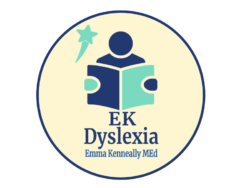About Dyslexia

Dyslexia is known as a specific learning difficulty that causes problems with the literacy skills of reading, writing and spelling. It is more common than you think and at least 10% of the population have dyslexia.
Dyslexia is said to result from a deficit in the phonological component of language. Phonological processing is our brain’s word sound processing system. It is used to process phonemes, the basic sound components in language. How children master the rules of phonics for decoding (sounding out words) and encoding (spelling words) play a key role in phonological processing. For children who are developing reading skills in particular, dyslexia can cause a lot of frustration.
- Dyslexia is hereditary and tends to run in families.
- Dyslexia may co-occur with other difficulties e.g. Dyspraxia (DCD), Dyscalculia and Attention Deficit Hyperactivity Disorder (ADHD).
- Some of the key characteristics of dyslexia include difficulty in identifying sounds and their corresponding letters, sounding out words, difficulty in remembering common sight words, reluctance to read and missing place when reading , reluctance to write stories and confusing spellings and tenses, problems in remembering maths tables and completing maths problems.
- Individuals with dyslexia may also have difficulties in other areas e.g. time management, personal organisation, remembering information, sequencing days of the week or months of the year and social and emotional difficulties
- Dyslexia occurs across a continuum from mild to severe.
- The impact of dyslexia on an individual depends on its severity and whether or not he or she has received appropriate intervention. It is important to intervene early as soon as you notice any early warning signs and if you are aware that dyslexia runs in your family
- A child’s understanding of a topic and their oral ability may not always be reflected in their written work.
- It is important to note that dyslexia is not related to intelligence but is rather a different way of dealing with language in the brain, many children with dyslexia have average to above average intelligence.
- Children with dyslexia often possess significant strengths in creativity and ideas, oral language and communication skills, social skills, leadership and delegation skills and are often described as big picture strategic thinkers visualising in three dimensions and in incredible detail. They excel at seeing the big picture and bringing together information from different domains.
- For these reasons, individuals with dyslexia often make excellent designers, talented artists, architects, athletes, authors, engineers, musicians, plumbers and scientists.
- Individuals with dyslexia will learn best when their interest is engaged and will remember things they have experienced better than abstract or non-contextual facts. This is why linking learning to real life experiences and events proves very effective for the learner with dyslexia.
- And remember the good news is that giving appropriate interventions, approaches and strategies, children with dyslexia can succeed in their learning and thrive to reach their potential.


Dyslexia Learning
Emma is trained in a specific programme for students with dyslexia called ‘Conquering Literacy’ which is widely used by specialist dyslexia teachers. This is based on research and relevant theories about the acquisition of literacy, acknowledging the need for a specific tailor-made programme for those with dyslexia. This programme acknowledges research that children with dyslexia need structured, cumulative, sequential and multi-sensory programmes in order to achieve success. Multi-sensory teaching builds on the child’s strong channels of learning while also developing the weaker ones. It involves making clear links between the visual, auditory, kinaesthetic and tactile senses. In other words, a link means that two, but preferably three or four senses should be simultaneously engaged in any activity.

My learning helps foster links in the brain allowing the child to retain and recall what has been taught for long-term memory. The dyslexia programme also acknowledges developments in research into dyslexia given more prominence to the roles of speed of processing, automaticity and working memory. From using this programme in my teachings, I noticed significant gains in reading and spelling in learners with persistent literacy difficulties. However, as no ‘one size fits all approach’, Emma strives to personalise her teaching to meet individual needs.
As part of each lesson, your child will practise a wide range of skills that will support their learning to include areas such as:
- Alphabet arc
- Visual and auditory memory
- Understanding phonetic code
- Phonological awareness training
- Decoding skills
- Reading comprehension
- Oral reading fluency
- Spelling and writing Skills and punctuation.
However, the skills covered are based on the individual child’s specific needs and individual requirements such as strengthening pencil grip, writing speed, planning, organisation, concentration and attention are also explored throughout. This programme is structured and cumulative allowing for over-learning, which is vital for learners with possible dyslexia.
